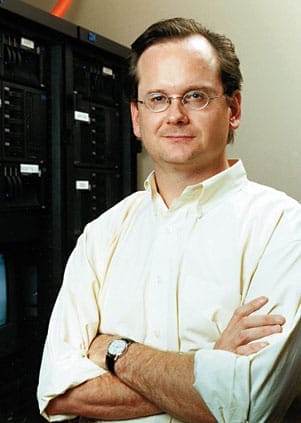 In the realm of internet politics and law, no one even approaches Lessig’s stature,” Wired magazine proclaimed in 2002. “He is cyberlaw.” Since the mid-1990s, Stanford Law Professor Lawrence Lessig has been engrossed with the intersection of constitutional law and intellectual property law—formerly uncharted territory where he is taking on some of the world’s most powerful corporations.
In the realm of internet politics and law, no one even approaches Lessig’s stature,” Wired magazine proclaimed in 2002. “He is cyberlaw.” Since the mid-1990s, Stanford Law Professor Lawrence Lessig has been engrossed with the intersection of constitutional law and intellectual property law—formerly uncharted territory where he is taking on some of the world’s most powerful corporations.
In 1998 he gained notoriety when he was removed, at Microsoft’s instigation, from the landmark case DOJ v. Microsoft Corp. In 2002, he argued unsuccessfully to overturn the 1998 Sonny Bono Copyright Term Extension Act in Eldred v. Ashcroft—his first case before the U.S. Supreme Court, and only his second case in front of any court. Despite the setbacks, proponents of “free culture” and the “wiki” model of Internet collaboration see him as a folk hero. Lessig has gained a following and even inspired a student movement based on the belief that overly restrictive copyright laws hinder creativity in society.
The Supreme Court Building is a long way from South Dakota, where Lessig was born in 1961. After graduating from the Wharton School, this third-generation Penn graduate studied philosophy at Cambridge University, where he encountered ideas that helped set him on a collision course with his conservative upbringing.
He went on to graduate from Yale Law School. By his own description a “constitutional scholar whose first passion is constitutional interpretation,” he clerked for the distinguished University of Chicago law professor Judge Richard Posner on the 7th Circuit Court of Appeals, then U.S. Supreme Court Justice Antonin Scalia. Having taught at Harvard and the University of Chicago, Lessig is currently a professor at Stanford Law School, founder of its Center for Internet and Society, and a fellow of the American Academy of Arts and Sciences.
As an avid supporter of free and open source software, he is also founder and CEO of the Creative Commons, a board member of the Electronic Frontier Foundation, and on the board of directors of Software Freedom Law Center. His book Free Culture: The Nature and Future of Creativity was the text for the 2006 Penn Reading Project, in which all incoming freshmen read and discuss a selected book.


























